The Evolution of a Physical Therapist
I’ve been a practicing Physical Therapist since 2003. I’ve observed a lot, talked to a bunch and read a lot. By all means, I am no expert! The evolution and growth of a physical therapist can take many roads.
I am always learning and listening but at times I do become complacent (that’s human nature). I’d be the 1st to admit that. I sometimes get stuck in my ways despite what others are saying in the literature or on social media.
I think that’s the great thing about social media…it keeps me listening. It has helped me to evolve and keep me on my game.
Ultimately, what has kept me on my game has been my desire to give my patients the best care that I can give them. I would expect the same from my own personal healthcare provider (I have a PCP, dermatologist, and a rheumatologist).
We have a responsibility to be the best for our patients. There are a lot of people chirping their opinions all over the place s I wanted to take this time to reflect on how I’ve seen many PT’s grow.
I’ve always wanted to write this post but I was inspired by my friend and co-owner of Champion Physical Therapy Mike Reinold when he posted this graphic on his Instagram feed.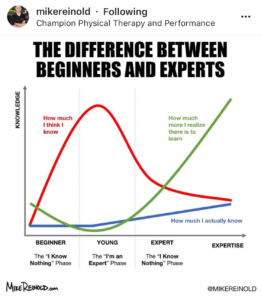
I’d like to briefly chat about the evolution of a physical therapist through my eyes.
There seems to be a general development that occurs in the PT world- most are good but I’m beginning to see a side that is a bit disheartening. Maybe it’s a social media thing but I think we need to take a step back and re-evaluate for a second.
We’re always looking for a protocol to guide our patients. Here’s my attempt at the phases of a PT…Hope you enjoy (some of it is tongue-in-cheek so don’t get all crazy on me!)
The New Grad DPT student
This is the hungry, newly crowned physical therapist looking to break into the profession. Their eyes finally on the prize but probably scared to death (I hyperbolize). No more clinical instructors to guide you. No more reliance on someone else to lead the way. The plan of care is all yours!
Looking at your schedule for the next day or week, you may see that eval that worries you. Someone on the schedule with a diagnosis of “LBP” or a post-op ACL.
It was easier to treat these when your CI called the shots and you could observe, help and chime in with your thoughts and treatments. Accountability was minimal but the rewards seemed grandiose when the patient emerged with better function.
- When is it safe to push an ACL?
- How fast should one start strengthening after a rotator cuff repair?
- When is it safe to start a throwing program after a Tommy John surgery?
- What do you tell the patient when they come in with their 1st episode of acute low back pain and how do you treat it?
These are just a few of the challenges a new grad has to face.
Insurances are daunting. People can be daunting. You greatly influence the functional outcomes of that person sitting in front of you. Your words and actions matter but you don’t know that yet.
I often compare this stage to a new NFL quarterback who struggles to read defenses and rushes the ball when he throws…oftentimes to a defensive back waiting for an easy interception. He wasn’t anticipating that defense and got nervous. The game was moving too quickly and he can’t keep up with the schemes.
This is the new grad, a simplified version, but one that tries to do a lot but has minimal experiences and abilities to “read the defense.” The game is moving quickly and your decisions often come with little confidence.
But don’t worry, the game will slow down a bit.
2-5 years out and Feeling Confident
At this point, you’ve seen a bunch. You better understand the complexities of people, the medical system and how to kinda manipulate your way through. You realize that you can do it but your school studying was only a small prep for reality.
You’re motivated, finding your groove and beginning to get comfortable. There are still some questions but you don’t have to rely on the other PT’s in your group to help with progressions.
Pubmed has hopefully become your greatest ally, hopefully.
Although I do run into many that rely on Facebook and Twitter for their ‘research’. There’s always a post looking for advice on progressing a meniscus repair or return to a sport after an ACL.
I’ll often direct them to PubMed because just feeding people research is not helping them in the long run. They need to know where to find the information and learn how to interpret it.
The game is slowing down and your confidence is growing. Some even think they’re super-confident and try to ‘take on the world’. They are the ones out on social media leading the charge for change. A revolution of sorts…that their way is better than what has been done the past 5, 10, 20, 40 years!
They’re seeing their practice through rosy glasses with blinders. Blind to the fact that there are many before them who equally tried to champion a cause only to find out there’s more to it. The journey, although it seems triumphant and vigilant, falls short.
There will always be a new treatment technique, new modality a new system that is promising better outcomes. Your words, although seemingly loud, fall on so many deaf ears because the ship is going to steer itself. You’ve tried to lead the charge only to learn that the profession of PT is bigger than you.
You can only control what happens within your practice, or the few people that follow you on Instagram. Although those ‘followers’ are often bots of some sort, pretending to like your content.
It’s a strange world out there, your words are seemingly wise, but there are so many out there shouting similar words that it gets drowned out. You think your experiences, although limited in the grand scheme of things, should guide your practice and the people that ‘follow’ you.
This, my friend, is where you’ve gone wrong. You have a ways to go. In fact, you’ll never get there. You’ll realize that each day presents a new challenge that doesn’t fall into a predefined mental algorithm.
When you have this revelation, then I think you’re ready to explore the next phase of your growth curve.
5+ years- beyond
The chart above calls you an expert but I’m not 100% a fan of this. No one in our field is truly an expert because there are challenges way above anything we could ever control.
Each personality that enters into our facilities presents with life stories that have shaped their pain, their expectations, and their outcomes.
But you know what, it’s at this stage that you realize that you are only a small piece of the puzzle. You can only help guide the process based on your plethora of experiences.
You’ve stayed on top of the literature and have altered how you practice. You no longer think that your way is the best but have dabbled in many other systems and taken a bit from all of them. Your way is NOT the best way.
You also have come to realize that there are always outliers out there. You know the ones that think the extreme positions are the best for all patients.
For example, there’s a huge social media push that says “manual therapy sucks”. No one should use manual therapy and you’re only wasting your time.
The flip side arguments say that there are many people that have a shifted inominate (whatever the hell that means) or a rib that is out of place. That therapist has been pounding on that pelvis or relocating that rib 1x per week for 52 weeks and has that patient convinced that they need more visits.
These are the outlier PT’s (I’m not speaking for other professions so don’t try to sucker me in) that are loud on social media but don’t necessarily represent the majority.
You see, the majority are trying to do it correctly (at least I think they are). The young PT that is 2-5 years out only sees those outliers as a challenge to his/her practice and is trying to yell at them. When in reality, you’re speaking to the minority, the group that barely exists.
You should be speaking to everyone else. The ones on social media that have taken a middle-of-the-road approach. They are doing their best, are on facebook looking for advice and busting their butts in the clinic.
They are limited by resources, time and updated knowledge. These are the people hungry to learn but are stuck somewhere in the 3 categories above.
These therapists are the ones you should be trying to chat with. You recognize that your vast experiences can help them.
It’s when you have this breakthrough that I think you’re ready to enter that last growth phase. You’re confident in your practice and willing to share. You speak to other groups, you publish clinical research, and you review research papers for journals.
To me, this is the utmost level and should be where most of the PT’s strive to get. Your knowledge continues to grow as you read. Each patient experience and interaction is another mental data point that sharpens your practice. These data points will blend in with your research readings and produce a so-called ‘expert’.
I invite you to challenge yourself by aligning with a clinician or group that produces clinical research, reviews journals and stays on top of the literature. Until then, don’t talk the talk unless you can walk the walk.
Some will think I’m being harsh, but I think you’ll have the realization, like I did back in the day, that our PT profession is bigger than us. Control what you can control and keep the ultimate goal in mind- THE PRIORITY IS TO GIVE THE BEST CARE FOR OUR PATIENTS, ALWAYS!
I’ve written about this before…about empowering the patient and keeping them in the driver’s seat. Check it out here.
I’d love to hear your comments. Please share with your friends, new grads and experienced PT’s. Social media has given many a voice but the loudest voices are not always the wisest voices!

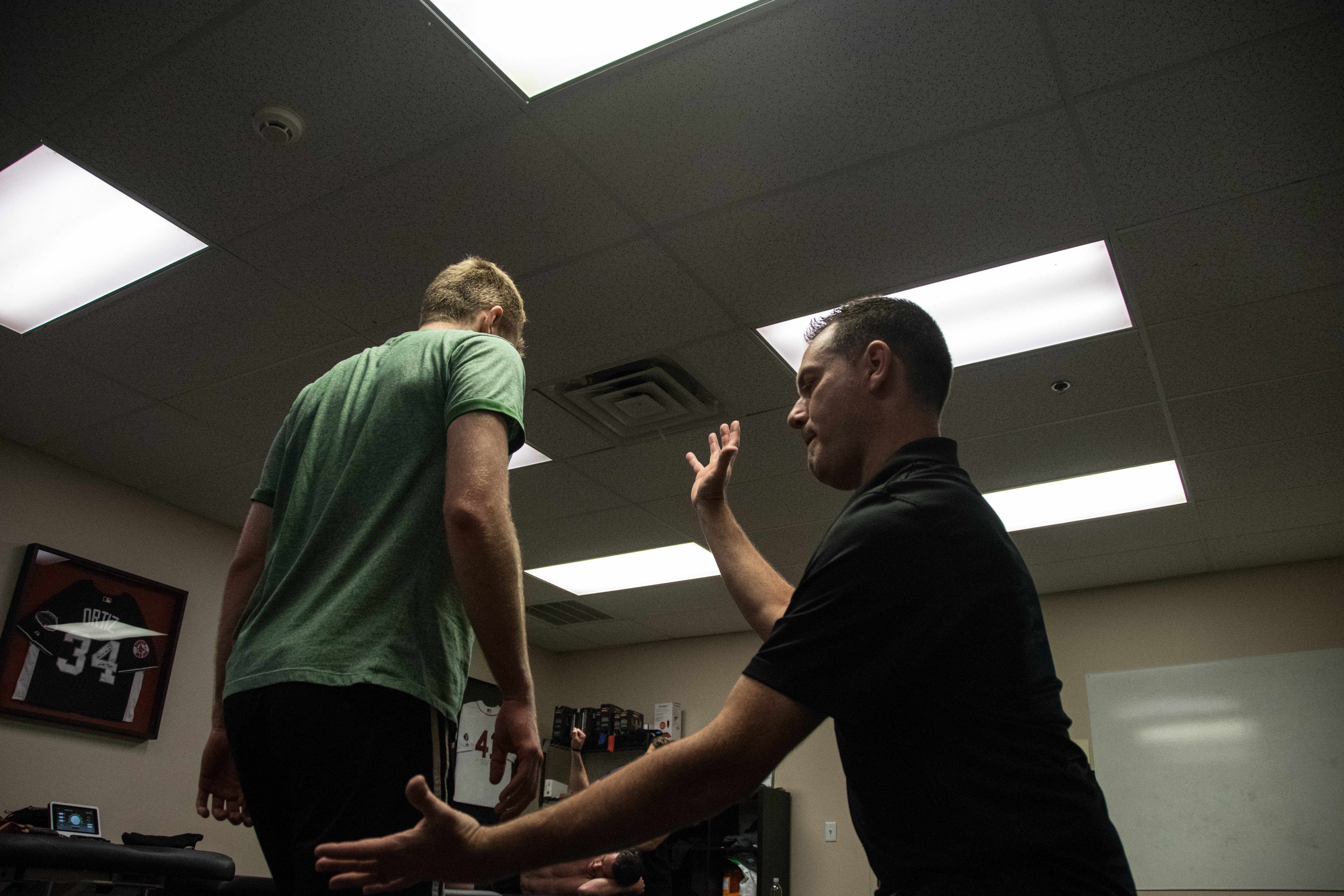
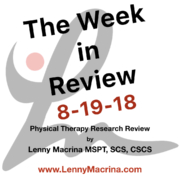
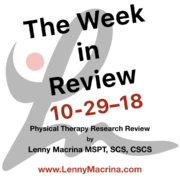

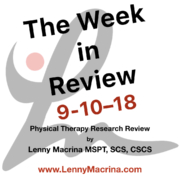
 2019
2019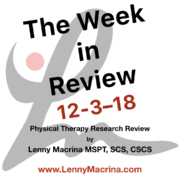


Wow, you nailed it on the head! I’m sure you understand and empathize with the PT’s who’re stuck somewhere in between trying to carve a niche. I struggle on many days trying to sharpen my practice and be the best resource for my patients but for the bad days, this article is so helpful. Respect!
Thanks for the kind words! Good luck with your practice.
I think you summarized the whole picture in a great simple-written post. Wide spread protocols, new fancy machines and instruments, spectacular manual techniques give us the false idea of being better than everyone around. I’m at the 3rd year after my graduation and the more i get involved the more i get frightened about the vast amount of knowledge out there. I guess perfection cannot be found in PT field, only constant improvement. Thank you for your posts Lenny, totally inspiring.
Thanks Mark! Yeah, there’s a lot but stick to your basics and be able to connect with your patients. Everything else will fall into place.